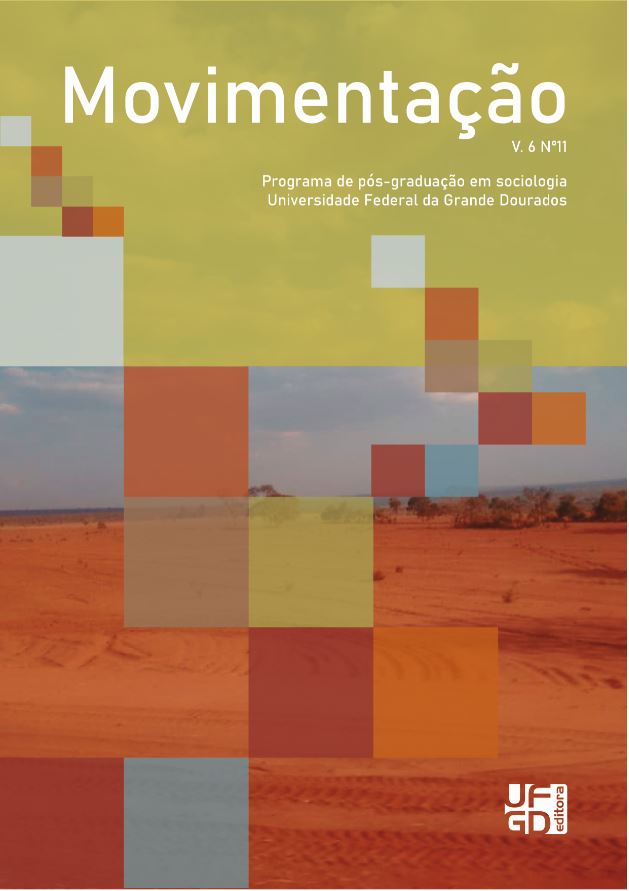Entre livros e o roçado: trajetórias educacionais no assentamento João Canuto–PA
DOI:
https://doi.org/10.30612/mvt.v6i11.10759Palavras-chave:
Educação do/no campo. Assentamento João Canuto. Escola Dom José Gomes.Resumo
Este trabalho tem como objetivo analisar as práticas educacionais do/no campo a partir das experiências da Escola Municipal de Ensino Fundamental Dom José Gomes, localizada no assentamento João Canuto, no município de Xinguara/PA. A partir de um pesquisa qualitativa, foram realizados estudos de campo e entrevistas com sujeitos que vivenciaram tais trajetórias, e ainda vivenciam no processo de construção da educação no campo, tais como as professoras da escola deste assentamento e seus moradores. Conjuntamente foram analisados os arquivos escolares e seus materiais didáticos, da coleção Novo Girassol: Saberes e Fazeres do Campo 5º ano (PNLD 2016/2018) conjuntamente ao aparato legislativo sobre educação e educação no campo. Através da metodologia da história oral e diálogo com um mote de autores buscamos entender como novas práticas educativas foram gestadas neste processo de luta, pautadas na emancipação dos sujeitos, reafirmação de suas identidades e na valorização de saberes centrais para fixação do homem no campo.
Downloads
Referências
BRASIL, Ministério da Educação. Secretaria de Educação Continuada, Alfabetização e Diversidade. Educação do Campo: Diferenças rompendo paradigmas. Caderno SECAD. 2. Brasília: SECAD, 2007.
CALAZANS, Maria Julieta Costa. Para compreender a educação do Estado no meio rural - traços de uma trajetória. In: Jacques Therrien e Maria Nobre Damasceno (coords.). Educação e Escola no campo. Campinas: Papirus, 1993.
CALDART, R., S. Por uma Educação do Campo: Traços de uma identidade em construção. In: ARROYO, M.G.; MOLINA, M. C. (org.). Por uma Educação do Campo. Petrópolis, RJ: Vozes, 2004.
CALDART, R.S. Sobre educação do campo. In: FERNANDES, B.M.; OLIVEIRA, C. J.; SANTOS, C. A.; DUARTE, C. S.; MICHELOTTI, F.; MOLINA, M.C.; CALDART, R.S. Educação do campo: campo - políticas públicas - educação. Brasília: Incra; MDA, 2008. DUART, Clarice Seixas. A Constitucionalidade do Direito à Educação dos Povos do Campo Educação do Campo: campo- políticas públicas – educação In: FERNANDES, Bernardo Mançano et al. Brasília: Incra; MDA, 2008.
FERNANDES, B. M. A formação do MST no Brasil. Rio de Janeiro: Petrópolis, 2000.
FERNANDES, B. M. Diretrizes de uma Caminhada. In: ARROYO, M.G, CALDART, R.S., MOLINA, M.C (orgs.) Por uma Educação do Campo. Petrópolis, RJ: Vozes,2004. p. 133 – 146.
HAGE, Salomão. Movimento de educação do campo na Amazônia paraense: ações e reflexões que articulam protagonismo, precarização e regulação. 37ª Reunião Nacional da ANPEd – 04 a 08 de outubro de 2015, UFSC – Florianópolis.
LEITE, Sergio Celani. “Urbanização do processo escolar rural. Educação e Filosofia,10,285-298, ju/ dez.1996.
MOLINA, Mônica Castagna (org.). Educação do Campo e Pesquisa. Brasil. Ministério do Desenvolvimento Agrário, 2006.
MUNARIM, Antônio. Trajetória do movimento nacional de educação do campo no Brasil. In: Revista do Centro de Educação da Universidade Federal de Santa Maria, Vol. 33, n. 1, p. 57- 72. Jan./Abr. 2008.
PASSADOR, C. S. Um estudo do projeto escola campo – casas familiar rural (1990-2002) do Estado do Paraná: a pedagogia da alternância como referencial de permanência. Tese apresentada ao Curso de PósGraduação em Educação da Universidade de São Paulo. 2003.
PEREIRA, Airton dos Reis. A luta pela terra sul e sudeste no do Pará: migrações violência no campo. Tese (doutorado em história). Programa de Pós-graduação em História. Recife (PE). Universidade Federal de Pernambuco, 2013.
PERIPOLLI, Odimar João; ZOIA, Alceu. O Fechamento das Escolas do Campo: O anúncio do fim das comunidades rurais/camponesas. Disponível em http://sinop.unemat.br/projetos/revista/index.php/educacao/article/viewFile/435/273.Acess o em: Julho de 2018.
Downloads
Publicado
Como Citar
Edição
Seção
Licença
Os autores devem aceitar as normas de publicação ao submeterem a revista, bem como, concordam com os seguintes termos:
(a) O Conselho Editorial se reserva ao direito de efetuar, nos originais, alterações da Língua portuguesa para se manter o padrão culto da língua, respeitando, porém, o estilo dos autores.
(b) Autores mantém os direitos autorais e concedem à revista o direito de primeira publicação, com o trabalho simultaneamente licenciado sob a Atribuição-NãoComercial-CompartilhaIgual 3.0 Brasil (CC BY-NC-SA 3.0 BR) que permite: Compartilhar — copiar e redistribuir o material em qualquer suporte ou formato e Adaptar — remixar, transformar, e criar a partir do material. A CC BY-NC-SA 3.0 BR considera os termos seguintes:
- Atribuição — Você deve dar o crédito apropriado, prover um link para a licença e indicar se mudanças foram feitas. Você deve fazê-lo em qualquer circunstância razoável, mas de nenhuma maneira que sugira que o licenciante apoia você ou o seu uso.
- NãoComercial — Você não pode usar o material para fins comerciais.
- CompartilhaIgual — Se você remixar, transformar, ou criar a partir do material, tem de distribuir as suas contribuições sob a mesma licença que o original.
- Sem restrições adicionais — Você não pode aplicar termos jurídicos ou medidas de caráter tecnológico que restrinjam legalmente outros de fazerem algo que a licença permita.



